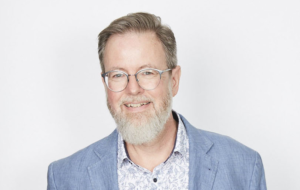Thomas Weaver
BioLeader Interview – Thomas Weaver (March 2021)

I am a native Wisconsinite who trained at the University in Madison (BSc in Math and Biochem, PhD in Oncology) but then moved to the UK 30 years ago as a postdoc at the MRC Laboratory of Molecular Biology in Cambridge. This was an exciting time in Cambridge with many labs just starting to apply large scale genetic and molecular screens to characterize biological processes from embryology to normal adult physiology and disease. The Human Genome Project was a natural extension of this endeavour and my involvement/interest was, and still is, focused on deploying scalable disruptive genome technology to progress the study, diagnosis and treatment of disease. I have contributed by leading national UK government R&D infrastructure programs in Cambridge and Oxford enabling large scale genomic analysis in both human and model organisms. Part of this journey has been in “translation” of basic research into commercial companies, where I have been involved in multiple genetics/biotech start-ups as an executive and an angel investor.
That is all fine and dandy, but the real reason I am in Cambridge originates in grad school where I fell in love and married Rachel Drysdale, a Brit, and a geneticist to boot (the real one in the family). It was Rachel’s idea to move back to her alma mater Cambridge (where she did her part II in the first, and greatest genetics departments in my opinion). We have two darling daughters, who are not geneticists by the way, independent assortment of traits to be sure.
Key milestones in your career journey to date?
- Developing new technologies to solve practical operational problems, such as how to amplify whole genomes robustly, applying gravitational algorithms to improve genotyping, miniaturizing and automating assays to become faster, cheaper, better…
- Working in model organisms, from virus to man, engaging with national/global genetics programs, convincing national governments to pony up, harmonize methods and share data.
- Being part of five start-up companies in Cambridge, including Hexagen, one of the first genetics companies in Europe. I remember the strapline in Biocentury, “10,000 mice can’t be wrong”, well, that turned out not entirely true, so we changed to human genetics after about a year. Being prepared to pivot was a life lesson.
- Winning the Genomics England contest for best software to interpret clinical genomes, proved a company of six people (3 full time) can beat billion-dollar market cap corporates. Since then, thousands of children have received a definitive diagnosis because of this software.
Who has had the greatest influence over your career?
- As an undergrad: Walter Plaut, a Jewish immigrant whose family fled Germany to the USA, where he studied genetics in Madison (wrote his PhD in 6 weeks), he taught me so much, not least was how to play squash; Also, Tom Record, a physical chemistry professor who could beautifully mesh complicated math with chemistry to explain molecular interactions.
- As a grad student: Howard Temin and Bill Dove, both taught me to love molecular genetics and systematic mutagenesis, strategies I have used throughout my career to understand gene and protein function in complex systems.
- In the UK: Mike Ashburner for an encyclopaedic mind and generous spirit, he helped me win my first grant; Mark Bodmer and Andy Sandham for giving me my first break and the confidence to leave academia, have a go at your idea, and then do it again.
Your approach to spotting and developing top talent?
- Work with individuals who are smarter than you are, learn and share ideas together.
- Value people who have done something impressive recently, don’t bank on old successes.
- A PhD or Ivy league degree doesn’t mean you are better or more qualified! I know technicians who can/do whip my butt at science, and I would much rather have them on board than others braying about OxBridge qualifications.
- Job titles are not self-defining and can get in the way.
What attributes make an outstanding leader in today’s world?
- Natural ability honed by years of experience, too many people are rushing for instant success.
- Staying power and commitment to an idea, that said, be prepared to pivot for good reasons.
What is our industry’s contribution to improving climate change?
- I believe technology will give us solutions, but these will only work if our behaviour follows suit.
- Zoom vs traveling 5000 miles for a series of 30’ coffees in January.
How do you create a culture of continual learning, innovation and curiosity?
- Create a forum where people regularly present their ideas, I fondly remember the “chalk talks” and tea time discussions at the LMB, these were where the best ideas came from.
- Reward people by letting them take an idea and run with it, also listen to the quiet ones who avoid drawing attention in open forums.
- Keep your (virtual) door open at work, listen to colleague’s ideas and requests while at the same time encourage them to buy-into the need to stay focused and within budget!
What’s your hidden talent or something that might surprise others about you?
- I can cook, and my favourite state is actually New Mexico.
Thoughts on the current funding model for early stage companies?
- I love the ecosystem, but we need more specialist funds at all stages.
- Wouldn’t it be nice if there was more lab space with flexible terms for start-ups and greater government support? I look at what is happening in China with no small amount of envy.
What will be the biggest technological transformation in the industry over the next 5 years?
- It is so cool that DNA as a physical molecule is back in vogue (not just the data it encodes). Using nucleic acid as a therapeutic has hit the headlines with Covid, but certainly will have massive impact in many areas of disease.
Your views on encouraging volunteering amongst colleagues?
- Great idea. At my most recent company PetMedix we have introduced paid leave for volunteer work. We were planning a company-wide couple of days to do something together, like helping at an animal shelter or gorilla gardening, but Covid has distracted us.
Your legacy to the sector?
- Inventing some rather off the wall names for newly discovered genes, but seriously, advocating genetics and model organisms for the last 30+ years.
Your simple philosophy on life?
- Love your family. Have fun at work, if you are not, do something else.
Words of wisdom?
- Best Advice I was given: The only sure way to fail is not trying, and as we say in Wisconsin, Keep ‘er movin’.
- Advice I’d give: When the management consultants are brought in, start looking for another job.
- What I wish I’d known: That the chance we would leave Europe was real, I could/should have been more proactive making the case that together we are better.
Click here to read more of our BioLeaders interviews.

